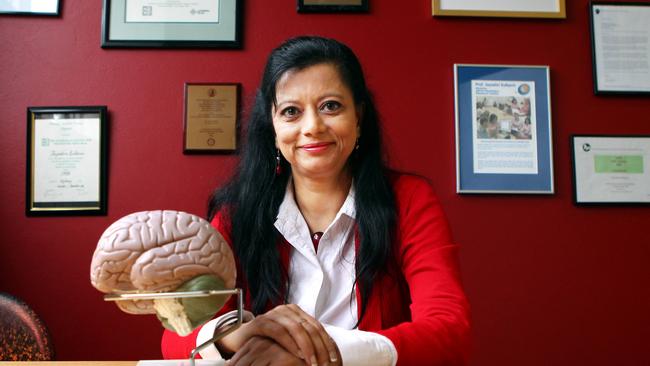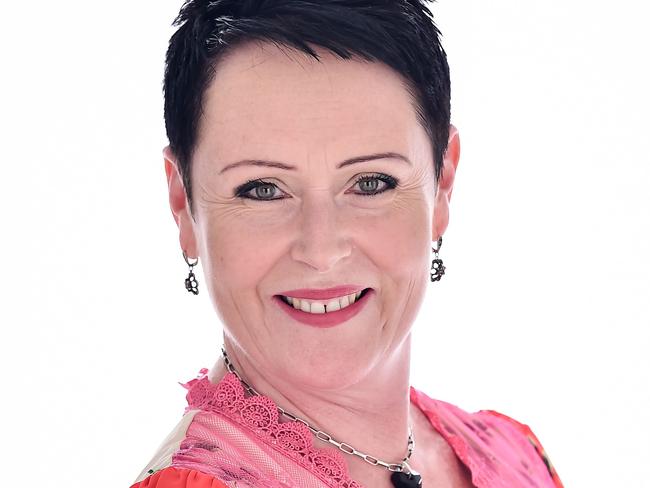The issue blindsiding women, and what to do next
Rae Bonney’s anxiety and depression got really bad when she entered her 40s and she suffered for years. But within a week she was able to transform her life through this change.
Menopause
Don't miss out on the headlines from Menopause. Followed categories will be added to My News.
Many woman are blindsided by menopause’s mental health impacts, experts warn, and suffer in silence for years with symptoms that could be treated.
Beyond Blue chief executive Georgie Harman said the mental health impacts of perimenopause “go largely under the radar”, while Monash University HER Centre Australia director and psychiatrist Professor Jayashri Kulkarni revealed some women suffered for years before making the connection.
She said symptoms could include anxiety, panic, rage, brain fog, depression, poor self-esteem, paranoia and fatigue.
“Panic over things that she’s done time and time again and with no problem, she can suddenly have difficulties with,” she said.
She said, while this time in life could coincide with many stressors, such as ageing parents or increased responsibilities at work, it’s not as if life was never stressful beforehand.
“All of these things that she’s juggling are not new to her,” she said.
“It’s the person who suddenly says, ‘I used to be able to deal with all this, I just can’t anymore, and I don’t know why.’
“That’s the aha moment.”

Prof Kulkarni said she’d seen a university lecturer suddenly develop a fear of public speaking, or women who “suddenly” swap between feeling so low they are suicidal to being “totally fine” for week.
“A computer analyst … said she stood in front of the computer trying to workout out how to turn it on,” she said.
She said it was also important for women to be aware symptoms begin in their early forties, well before other physical signs.
“Of course once the periods change or there is a hot flush, it becomes obvious in retrospect,” she said.
“But there might have been a whole lot of years that are lost while people are still trying to work out what’s wrong.
“We have to stop thinking this is some secret business that can’t be discussed.”
Ms Harman said the issue was “under-recognised, under-researched and misunderstood”.
“The mental health symptoms can really blindside people, especially those who potentially have not experienced any mental health challenges in the past.”
Ms Harman said there was still a stigma surrounding menstruation and menopause, but it was starting to shift.
“We do not talk about menopause in the way that we do about other life events or health conditions,” she said.
“This sort of stigma exists about ‘is this a stain on my character, why I can’t cope, can I talk about this, am I only one feeling this way?’ when in fact it’s pretty likely that many women of similar age to you are feeling exactly the same way and that’s why we need to bring this out of the shadows.”
She said the record number of registrations for Beyond Blue’s April 2 webinar on the issue showed how many people wanted to talk about the issue.
Prof Kulkarni said menopause’s impact had been reduced to fertility for too long, but we were now learning more.
“Around the early forties is when perimenopause begins and it begins with changes in brain chemistry and brain circuitry,” she said.
She said she had no wish to “medicalise menopause” and emphasised that many woman felt fine during perimenopause.
“But the mental health symptoms, for a percentage of women in our general community, really affects them badly,” she said.

She said there were typically two types of patients, with the first reporting the sudden return of a mental illness that had previously been treated successfully.
“They’ve got it together and they’ve moved on and then all of a sudden it all falls apart in the mid-40s,” she said.
She said women who had previously had a hormone sensitivity were more at risk.
“This is women who might have had premenstrual disorder depression when she was younger, or post-natal depression,” she said.
“And so when those hormone fluctuations are more pronounced, which is what happens with the menopause, then we would expect and we do see that she actually has more difficulties with the mental health symptoms.”
“The second group [of patients] are women that we see who have never had any mental health problems and then all of a sudden at about 43, 44, she notices it.”
Melbourne’s Rae Bonney works in men’s mental health and said she still did not connect the dots when her depression and anxiety became “really heightened” in her early forties.
“I overlooked all of my symptoms for a long time,” she said.
“It really affected me.
“I remember when I eventually stopped menstruating completely, feeling another deep sense of grief and loss.
“Walking across a bridge at South Bank in Melbourne and it just hit me right in the guts. ‘Oh my god, I can't have children anymore’.
“And not that I wanted to have any more, but I just remember the feeling being so unreasonable but so powerful at the same time.”

She said it wasn’t until she hit her fifties, and it became particularly unbearable, that she sought help from a specialist menopause clinic, and was prescribed hormone therapy.
“Within a week, my life changed,” she said.
“I just felt so much more in control, my symptoms cleared up.
“I was able to blink again without feeling like I was blinking through sandpaper.”
She said it was a “tragedy” that so many woman were suffering with something that could be treated, and — through her work — now meets many other woman struggling.
“There are so many more options than you could ever imagine in terms of getting help,” she said.
“There was one woman in particular who was about to be dismissed and she was on her final warning for her behaviour,” she said.

“Her relationship with her husband had also broken down.
“Once we started working together, it wasn’t long before I asked her about how menopause might be affecting her.
“She said she didn’t really know anything about it.”
Ms Bonney said, once they addressed the issue, the woman’s life changed.
“She was able to get help for her menopause symptoms, retained her jobs and her relationship with her husband improved,” she said.
Prof Kulkarni said perimenopause-related mental illness responded very well to hormone therapy.
“This is not irreversible,” she said.
She said more typical depression and anxiety treatments, like talk-therapy and antidepressants, were still a better choice for some woman, and her goal was to simply widen patients’ options.
“It is about making a collaborative decision with the woman to say, ‘would you like to think about a hormone strategy?’,” she said.
“Maybe we try it for a bit and see whether that helps, and not to automatically reach for the antidepressant or several antidepressants or send the person off into quite a long lengthy talk therapy sessions that may not actually hit the target.”
Beyond Blue’s free webinar ‘The Menopause Mine field – looking after your mental health during perimenopause and menopause’ will run on Wednesday April 2 at 12pm. Register here


